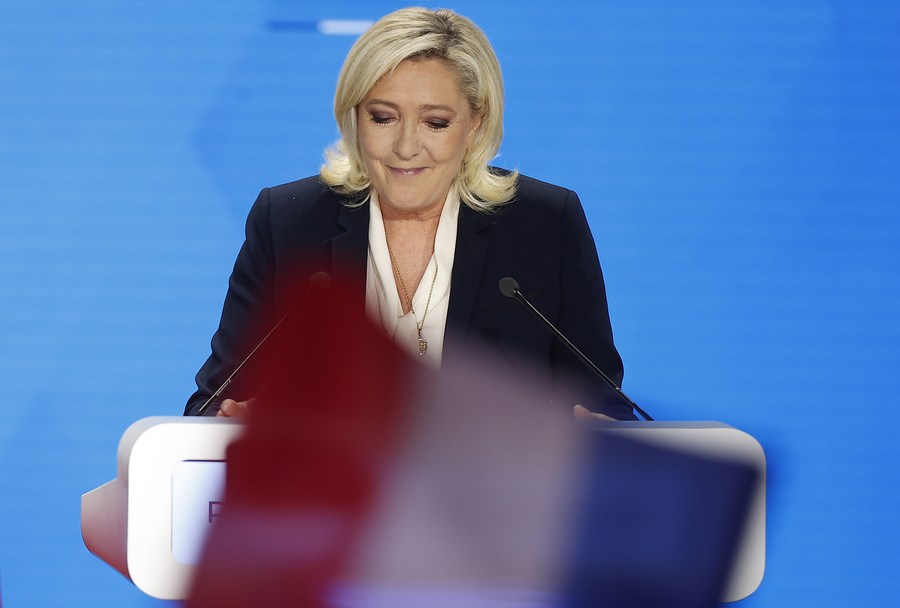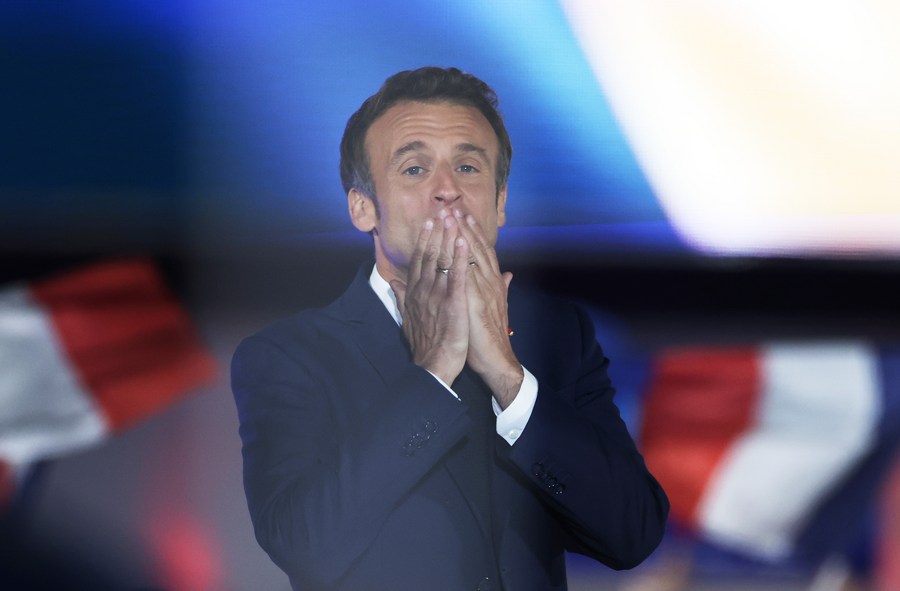Macron re-elected as French president amid domestic, international uncertainty
* French incumbent President Emmanuel Macron won the 2022 presidential runoff with 58.54 percent of the votes.
* The 44-year-old centrist and pro-European Union (EU) Macron will have to face challenges both inside and outside France during his second presidential term.
* It remains questionable whether Macron, under U.S. influence, can continue to push for European strategic autonomy during the remainder of France's EU presidency.
PARIS, April 25 (Xinhua) -- French incumbent President Emmanuel Macron won the 2022 presidential runoff with 58.54 percent of the votes while his rival, far-right wing candidate Marine Le Pen, gained 41.46 percent of the votes, according to the preliminary results released Sunday night by the French Interior Ministry.
According to some experts, the 44-year-old centrist and pro-European Union (EU) Macron will have to face challenges both inside and outside France during his second presidential term.
At the domestic level, the ongoing Russia-Ukraine conflict has pushed France's Consumer Price Index to skyrocket, creating further social divisions. On the international arena, it remains questionable whether Macron, under U.S. influence, can continue to push for European strategic autonomy during the remainder of France's EU presidency.

Photo taken on April 24, 2022 shows the scene of French incumbent President Emmanuel Macron's rally after the presidential runoff in Paris, France. (Xinhua/Gao Jing)
A MORE DIVIDED FRANCE
For a third time, France's far-right wing lost the presidential runoff, but it has never been so close to grabbing the presidential power of the world's seventh-largest economy.
The Le Pen family is the founder of France's far-right wing. Jean-Marie Le Pen contributed to founding the National Front party in 1972.
In the 2002 presidential runoff, Jean-Marie Le Pen lost largely to Jacques Chirac with 17.8 percent to 82.2 percent of votes. Fifteen years later, his daughter, Marine Le Pen lost to Macron with 33.9 percent to 66.1 percent of votes.
This year, Marine Le Pen lost again, but according to her, "the result itself is a resounding victory."
"Millions of our compatriots have chosen the national camp and change. I extend my deepest gratitude to those who trusted me in the first round and to those who, by the millions, joined us in the second," she said in her speech after learning of the results of the exit polls.
Asked about why people would vote for Le Pen, a voting station staffer in Clichy-La-Garenne told Xinhua that people, from "the parts of France," who feel excluded would vote for Le Pen.
"They don't feel French anymore," he, without giving his name, said, referring to people from small towns and cities. "They no longer have doctors. They no longer have public services and therefore they feel excluded. So they go for Le Pen."

Marine Le Pen, candidate of the far-right National Rally party, attends a rally after the presidential runoff in Paris, France, on April 24, 2022. (Xinhua/Gao Jing)
"So it's not at all the classic racist vote of the extreme right, but a vote of protesting against exclusion," he said.
Macron acknowledged this in his victory speech, saying it is "the anger and disagreements" that pushed people to vote for the extreme right.
Division exists not only in Metropolitan France, but also in French overseas territories.
Le Pen is leading in all French overseas territories except French Polynesia and New Caledonia.
LEGISLATIVE ELECTION IN JUNE VITAL
During his presidential campaign, Macron said that he wants to govern differently for the next five years with an ambitious political project.
France needs "a different method, a way of doing things at the more local level" in favor of the most modest, he said, announcing a series of social measures to be carried out "urgently" from the beginning of his second five-year term.
The measures include improving the purchasing power of the French people "from this summer," and continuing to reduce taxes by 15 billion euros (about 16 billion U.S. dollars) per year until 2027.
He also plans to continue his failed retirement reform by increasing the legal retirement age to 65 "gradually by 2030."
Macron, who improved the ecological component of his political program in the second round of the presidential election to attract left-wing votes, indicated that his future prime minister would be in charge of ecological planning.
However, if he wants to realize all the promises, the upcoming legislative election will be extremely important, as it will decide whether he can get the majority of the French National Assembly.
Macron's re-election may have comforted some French for keeping the country "socialist," but two surveys showed that a majority of French people do not want Macron to win the legislative elections.

French incumbent President Emmanuel Macron attends a rally after the presidential runoff in Paris, France, on April 24, 2022. (Xinhua/Gao Jing)
According to two polls published Sunday evening by French daily Le Figaro, 63 percent and 56 percent of those questioned do not want Macron to have a majority, against 35 percent and 20 percent who want him "to have a majority in the National Assembly and can carry out" his policy.
Although left- and right-wing parties supported Macron after the first round voting, they now want to form their own alliance to prevent the newly elected president to control the National Assembly.
Ranking third in the first round of voting, Jean-Luc Melanchon, leader of the far-left wing party Unsubmissive France, has already launched negotiations with other left-wing parties, hoping to form a majority in the lower house of the French Parliament.
The Socialist party and the Communist party both called on the left wing to unite and reform for successful legislative elections.
On the right-wing side, after losing her second presidential runoff to Macron, Le Pen has already called on the French people to vote for her in the upcoming legislative elections.
Another extreme right candidate Eric Zemmour also called for "national unity for the legislative elections to build the first coalition of rights and patriots."
A STRONG EUROPE
Macron's re-election has indeed cheered Europe up, as some countries on the old continent have drifted further towards extreme right.
On social media, Charles Michel, president of the European Council, and Ursula von der Leyen, president of the European Commission, both congratulated Macron on his re-election.
"In this turbulent period, we need a strong Europe and a France fully committed to a more sovereign and more strategic European Union," Michel wrote.
Macron's new mandate will be part of the continuity in terms of foreign policy, since France still holds the rotating presidency of the Council of the EU till the end of June, said Mu Gengyuan, assistant research fellow at the China Institute of International Studies.
According to her, Macron's re-election will help him continue to promote the objectives of France's presidency under the motto "Recovery, Power, Belonging" and "a Europe that is powerful in the world, fully sovereign, free in its choices and in charge of its own destiny."

French incumbent President Emmanuel Macron addresses a rally after the presidential runoff in Paris, France, on April 24, 2022. (Xinhua/Gao Jing)
France has also been pushing for a reform in the Schengen area, which will be politically monitored by EU public institutions to control the circulation of EU population and migrants.
In a campaign meeting in Strasbourg in northeastern France, Macron promised "to better protect" EU's external borders with more common forces and cooperation among the member states.
U.S. Secretary of State Antony Blinken also congratulated Macron on his win, saying that the United States looks forwards to closer cooperation with the ally.
Ukrainian President Volodymyr Zelensky also congratulated Macron.
Although France has joined the West to impose sanctions against Russia, Macron has been favoring a diplomatic solution to the Russia-Ukraine conflict.
Photos
 World Book Day: Let's read together
World Book Day: Let's read together Rare silver pheasants flock together in greater numbers to forage at Yishan nature reserve in east China's Jiangxi
Rare silver pheasants flock together in greater numbers to forage at Yishan nature reserve in east China's Jiangxi Young artist takes up brush to create lifelike paintings expressing mankind and nature’s harmonious co-existence
Young artist takes up brush to create lifelike paintings expressing mankind and nature’s harmonious co-existence Cutton farming in full swing in China's Xinjiang
Cutton farming in full swing in China's Xinjiang
Related Stories
- Xi congratulates Macron on re-election as French president
- Macron holds election rally for upcoming presidential election
- France's Macron announces bid for presidential re-election
- Commentary: Xi, Macron's conversation signals deepening cooperation, guides relations toward greater development
- Macron pledges full support for Beijing Winter Olympics, Paralympics
Copyright © 2022 People's Daily Online. All Rights Reserved.






